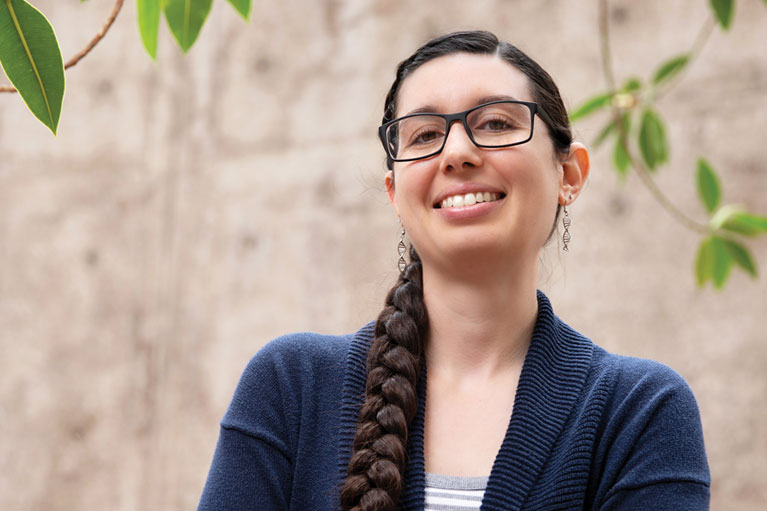Profiles
Flipping through a biology textbook in middle school, Laura Newman paused at a detailed picture of the cell. Specialized structures inside the cell, called organelles, captured her imagination as she thought about how these delicate, yet complicated, structures came to be.

Postdoctoral Fellow, Shadel Lab
In particular, she was fascinated by mitochondria, often dubbed the powerhouses of the cell. In evolutionary history, scientists believe that mitochondria began as bacteria with their own DNA before being enveloped by the cell. “Every cell essentially has this ancient bacterium living inside of it,” says Newman. “I thought that was so cool.”
But as she started college at Indiana University, Newman didn’t know that studying the fundamentals of biology was a career option. Instead, she pursued a double major in biotechnology and neuroscience in preparation for medical school. During her junior year, Newman was encouraged to work in a science lab. When she conducted her first experiments, she immediately knew her life would be forever changed.
“I fell in love with science in the lab. The process of conducting an experiment was rational and elegant,” says Newman. “Science is an amazing way to understand the world around you.”
So instead of medical school, Newman pursued graduate school in biochemistry, cell and developmental biology at Emory University. There, she explored the role of mitochondria during cellular stress before seeking a postdoctoral fellowship in a lab where she could further study the relationship between mitochondria, stress and the immune system.
“Salk Professor Gerald Shadel is a leader in how mitochondria activate the immune system. And members of the Shadel lab study everything about mitochondria,” says Newman. “Additionally, Salk is such a unique place to work because people are always excited to share ideas and resources, which makes collaboration so easy.”
At Salk, Newman’s main focus is on how cells can recognize when they’re sick or damaged in order to activate the immune system for cell survival. Collaborating with Assistant Research Professor Uri Manor, director of the Waitt Advanced Biophotonics Core, has allowed her to use cutting- edge microscopy techniques to generate some key revelations in her research. As a result of her and the lab’s research, she believes that mitochondria could be the organelles that signal to the cell that there is a viral infection or, possibly, drive inflammation. And inflammation underlies a lot of diseases, such as Alzheimer’s, Parkinson’s, diabetes and obesity.
Newman was a co-author of a paper about mitochondrial DNA stress signals that was published in Nature Metabolism in 2019, and she recently received an NIH-funded MOSAIC Postdoctoral Career Transition Award to Promote Diversity (K99/R00), which will fund her for the next five years as she finishes at Salk and starts to develop her own research program.
“I’ve always wanted to have my own lab, and this award will help open a lot of doors to allow me to achieve my goal,” says Newman. “When the coronavirus pandemic hit, I took that time away from the lab to work on the grant. I can’t tell you how excited I am that I actually got it.”
One of her interests is to better understand how mitochondria react to viral infections such as influenza, herpes and COVID-19. For example, mitochondrial DNA may get released during a severe COVID-19 infection, so Newman wants to examine the warfare between mitochondria and viruses in infected cells, with a focus on the inflammatory response.
Beyond the bench, Newman takes her expertise in biology home with her where she brews beer and kombucha. She enjoys experimenting with exotic flavors, including jalapeño and Hatch green chili. “I love being able to use my experimental knowledge of microbiology to brew different concoctions,” says Newman. “It’s a fun way to share science with my friends and family.”
Newman is also passionate about cultivating a positive lab environment and promoting mental health. She is a member of Salk’s Society of Research Fellows, the Committee for Trainee Affairs, and the Engagement & Wellbeing Initiative, where she helps foster a welcoming atmosphere.
“I’ve suffered from mental illness, and I am fortunate that at every stage of my scientific career, I felt supported, which helped me thrive despite my struggles,” says Newman. “Research is challenging, as failed experiments and rejection of grants and manuscripts can make it hard to keep going. Underrepresented minorities and women deal with additional challenges on top of that. Community support increases resilience and helps everyone to be successful.”
